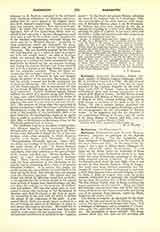

Barbarigo, GIOVANNI FRANCESCO, Italian Cardinal, nephew of Blessed Gregorio Barbarigo (1625-97), b. in 1658 at Venice; d. in 1730. He first entered the diplomatic service and was twice sent as representative of the Venetian Republic to the court of King Louis XIV of France. Later he entered the ecclesiastical state and became primicerius of the church of St. Mark at Venice. In 1697 he was named by Innocent XII Bishop of Verona, was transferred to Brescia in 1714, created cardinal 1720, and in 1723 became a successor of his uncle in the See of Padua. He was a zealous prelate, promoted the cause of beatification of Gregorio Barbarigo, and lent his encouragement to the production of literary works. To his suggestion was due the inception of the ecclesiastical history of Verona, and the works of St. Zeno, Bishop of Verona (362-380), were reprinted at his expense (Padua, 1710).
N. A. WEBER

